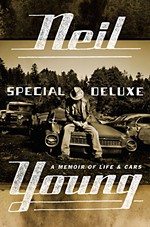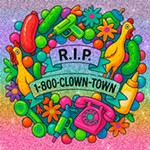Page Two: Throw Down Your Hatred
Neil Young's solo tour, Part 2
By Louis Black, Fri., June 18, 2010

I had finally finished this column around dawn. Right then, of course, I realized what it was I wanted to say, but I'm not sure that I've made anything any clearer.
In this time of baseless but overwhelming despair, the only truly revolutionary activity is creation.
Placing blame, making excuses, and damning others are soulless and monotonous activities. Many among us who are busy declaring the world is ending do so without grace or vision but instead as pathetic hucksters trying to hustle the suckers.
What was once the impassioned rhetoric of committed revolutionaries has become the comic book sloganeering of the profoundly unimaginative.
(Yawn.) "Oh my dear, look, freedom has been trampled, our rights have been taken away, and oppression is everywhere. Oh gosh, oh darn, the garden is dead, and mad Uncle Willie is still watering it."
Instead of hoping for the best, so many are praying for the worst.
The reality is that there are endless failures, but overwhelmingly they come from within and are committed by us. We are not living in the end of days but in a time of easy surrender. We are not facing the apocalypse but instead are dazzled by our own all-too-willing capitulation.
The great whine is upon us, and many have all too eagerly joined in the moaning. It is not simply the 10,000 cults of getting along by going along, nor is it just the easily led, politically immoral, and readily corrupted who are surrendering. It is all of us. Proudly, we are giving up.
Yes – the great whine is upon us; the whine is embraced, adored, and beloved. This is not the best of times; it is the very worst of times.
Those who once championed the future are busy pining away for an imagined past. The visionaries are describing what they see in their toilets; holy people are talking of their own vomit.
The whine and the lie are one: It was so much better then; it's impossibly worse than that now.
The idea is that in the past, since most citizens were serious thinkers and educated individuals, there was a truly informed and freethinking electorate. But now those days are gone. Once we all cared, but now none of us cares. Once we all believed, but we believe no longer.
It was much better then, but now the ground is so bare and hope so finely shredded that the Four Horsemen of the Apocalypse have dismounted to nap.
Except, of course, this version of the past is so magnificently false that it is beyond hallucinatory.
For a long time, criticizing this country and listing its failings were acts of courage. Once, to stand up to conformity invited scorn, and to try to ground the fantasies of an overly optimistic public in painful realities was the work of the brave. In the beginning, social criticism was driven by hope, belief in the future, respect for the common decency of humanity, and an understanding that we were all in this together.
Six decades along, this rhetoric has become one-dimensional. The underlying driving assumptions have dribbled away. Now what were prayers have become tiresome laments. Now what once was waving the banners of hope is now tearing down all signs except those of hopelessness. We live in a society where self-righteous self-celebration flowers in the fertile soil of loathing most other people. Now, instead of creation, we have defamation. Instead of ambition, there is resignation. Instead of having vision, we embrace the most tired clichés. Instead of the belief that we are always moving forward toward a light, no matter how distant it may be, now we welcome a smothering darkness out of the past.
This is not the best of all possible worlds. There are still vast changes to be fought for and still goals of justice and decency for which to strive. The only acts of revolution have always been those of innovation. In a time of the cheapest despair, offering any vein of hope is a visionary act. All too often now, instead of daring the new and attempting the seemingly impossible, we list all the things wrong with this world – the things that cause our failures. Now, the greatest works of art celebrate human flaws and social failures. Now, hope is treated as a cheap intoxicant, while despair is hailed as the holiest of truths. A book in which heroes triumph is a book of lies. A story in which humans fail wins awards.
Ours is a time when the empowered population (all of us), rather than explore all the opportunities available, has instead denied that any of them exist. Where once civilization was carved out of the wilderness, now civilization is decried and the wilderness fictionalized. Now, many clearly feel much more comfortable with hopelessness than with hope. Finally, instead of admitting and accepting responsibility for our failures, we offer up indictments of all those who caused them. In their wake, instead of rising from the dust to try again, many simply add water so they can wallow in the mud.
Young's concert was a courageous and visionary celebration of one of the most creative and restless artistic imaginations of our times. Instead of stepping back, it gleefully skated forward. Instead of playing it safe, it took risks upon risks. Young's career has always been an insistence that the new is better than the known and that exploration is more satisfying than repetition.
"There is a town in north Ontario
With dream comfort memory to spare
And in my mind I still need a place to go
All my changes were there."
"Helpless" was the third song Young performed. There is no question that Young is one of the greatest talents of his time, but part of his art is exploring the richness and diversity of all different kinds of connections – historical, familial, creative, and romantic. Young has always embraced, expanded, imagined, and reimagined history in all its ramifications. This is not history as mummified in textbooks or rendered meaningless by trivia. Instead, it is history as our shared past.
The first new song of the more than half-dozen he was to play was "You Never Call." The song starts off very funny. Young delivers some of the opening lines almost as a character in a play, setting listeners up. "You're in heaven ... I'm working."
This is where Young's humanity and intensity allow him to use tragedy rather than be subsumed by it. The song is about L.A. (Larry) Johnson, one of Young's closest friends and collaborators, who died unexpectedly earlier this year. Johnson was a big man in most every way; I can't remember if I ever saw him when he wasn't smiling.
Film was what initially brought Young and Johnson together. A Zen troubleshooter and a nonchalant spiritual presence, over time Johnson became part of Young's inner brain trust. He would walk around the stage before a show making sure everything was right. He did this not by barking commands but by smiling and laughing, by walking lost in thought and feeling. It was amazing to watch him work, because you never saw him working.I used to follow him around just to watch him work. Once I said to Elliot Roberts, Young's manager, "It's like I'm stalking him." Roberts replied, "You are stalking him." We both laughed.
Young's son Ben has cerebral palsy. Johnson and Ben were always hanging out together. One night, Johnson was picking up Ben to take him to a hockey game. Johnson got behind the wheel of the van to drive. He clutched his chest and died.
So though I started off laughing at the song, by the end I was quietly sobbing.
After the show, Roberts invited us on to Young's bus. Young was eating dinner, but he was in a great mood and very sweet.
We talked about the show. Of course, I was babbling, going on about how great it had been and how terrific the new songs are. We started talking about "You Never Call," which meant talking about Johnson.
Young said that the song was supposed to be very funny and very sad and moving. Talking about the song, he said that it was exactly the kind of thing Johnson would have said, "I'm in heaven, and you're working." We all laughed.
Afterward, my friend and I walked to our car, smiling and (as much as I hate to say this) glowing.
Later, I thought about how talking about history and the present in terms of humanity was so important. Told as stories of people and memories of family, friends, and love, history is enriched rather than restricted, sent soaring high above and deep inside rather than forced into a marriage with the mundane and moribund.
The politics of failing and failure are easy but empty. In a world viewed as a series of sayings sewn onto pillows, there is no hope and precious little meaning. In Young's world, where family connects with history while tragedy is leavened by joy, nothing is easy, but neither is anything empty.










